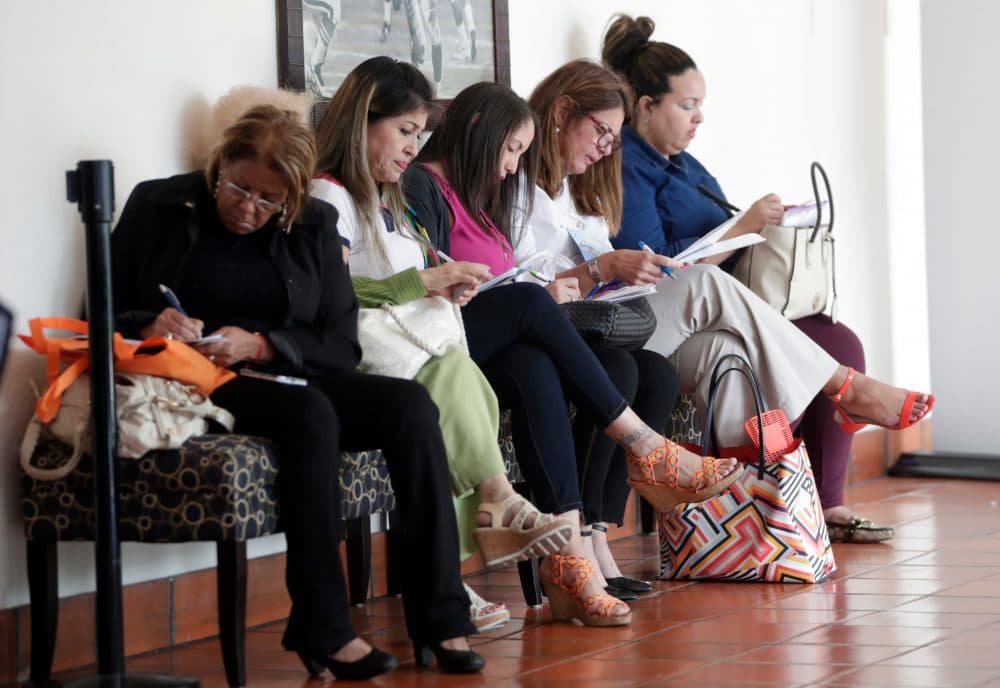Advertisement
The economic impact of the pandemic on women

Sign up for the On Point newsletter here.
There seemed to be a troubling economic trend in 2020. A mass exodus of women from the work force.
Economic historian Claudia Goldin says there was a divide in who was forced out of the work force.
“Certain people could work at home and certain people couldn't," Goldin says. "Some of the great divides in our society and in our economy became even larger.”
Today, On Point: The real economic impact of the pandemic on women.
Guests
Claudia Goldin, economic historian and labor economist. Professor of Economics, Harvard University. Author of many books, including Career & Family: Women's Century-Long Journey toward Equity. (@PikaGoldin)
Also Featured
Latrish Oseko, working parent in Newark, Delaware.
Rachel Cook, working parent in Tampa, Florida.
Beth Folsom, working parent in Framingham, Massachusetts.
Elise Gould, economist, Economic Policy Institute.
Nancy Weindruch, mom in Camp Hill, PA.
Interview Highlights
On the truth about the 'shecession'
Claudia Goldin: "We got it right and we got it wrong. And it's also the case that there was a lot of pain and a lot of problems. And I don't want in any way to say that there weren't those. So it was a 'shecession' in the sense that most recessions impact men more than women, because they affect the cyclically sensitive industries. This one had two things that were big and different. One was that it affected in-person services more. And women are employed more in in-person services disproportionately. And the other one is that it affected care, care of children, care of the elderly, care of the little ones. But by and large, the differences were still mainly by level of education rather than gender."
What were you doing in in 2019, 2020 that that that inspired you to reexamine the shecession?
Claudia Goldin: "In March of 2020, I was finishing a book, and the book is about how women have progressed and advance through history from a generation at the start of the 20th century who could have career or family, to women today who want to have both. And the book takes us through 120 years. It's called Career and Family. And during that period, many of the constraints on women were lifted. And many women today, of course, aspire to have career and family. But the question is, why can't they? And the book addresses, why isn't there more equality between men and women? Why isn't there more equity within the home for couples?
"And a large part of that is that jobs are greedy, many jobs are greedy. And for couples with children, we need one member of the family to be on call at home, even if that person has a high-powered professional job, and one member can be on call in the office and make a lot more.
"But in 2020, when the pandemic hit, I thought I was finished with the book, but I couldn't finish the book. A disaster had struck the world, but at the same time it handed me an epilogue. The pandemic magnified all of the issues that I was writing about, yet it also created a possible answer that many jobs ... had become more flexible.
"And that's what I wanted to explore. But in addition, I'm a historian and the pandemic recession was clearly different from any other that we had known. The sectors of the economy were hit differently, and in addition, it had the closing of all of these different kinds of care facilities."
On who was impacted by job losses during the pandemic
Elise Gould: "The biggest impact was really occupational segregation. So where you worked, whether or not your job could be turned into work from home, whether or not you had to face people in the pandemic, whether or not you lost your job. And so because of occupational segregation by gender, by race, by age, by education, certain groups were disproportionately impacted and lost their job. It impacted many different groups, not just by gender.
"You know, if you look by age, young people lost their jobs in huge numbers. I don't think as much was written about that. But you did see a return and you have seen a return of women. You have seen a return of Black workers, of Hispanic workers back in the labor force. As some of those jobs, many of them, obviously not all of them, but many of them have come back now."
On final takeaways
Claudia Goldin: "One of the things that we haven't talked about is what happened to the children. We have children who have lost a year or two. There are many different aspects of infrastructure here. We have to have better Internet. I mean, Latrish spoke about the fact that she couldn't work in a motel room because she didn't have Internet.
"We have to make certain that our schools are built better so that they had better ventilation. We have to reassure our teachers that they're going to be safe. And of course, paying them more would be nice as well. But there are light sides to the story. There are also dark sides, and the dark sides are the ones that we should act on quickly."
This program aired on November 17, 2022.

